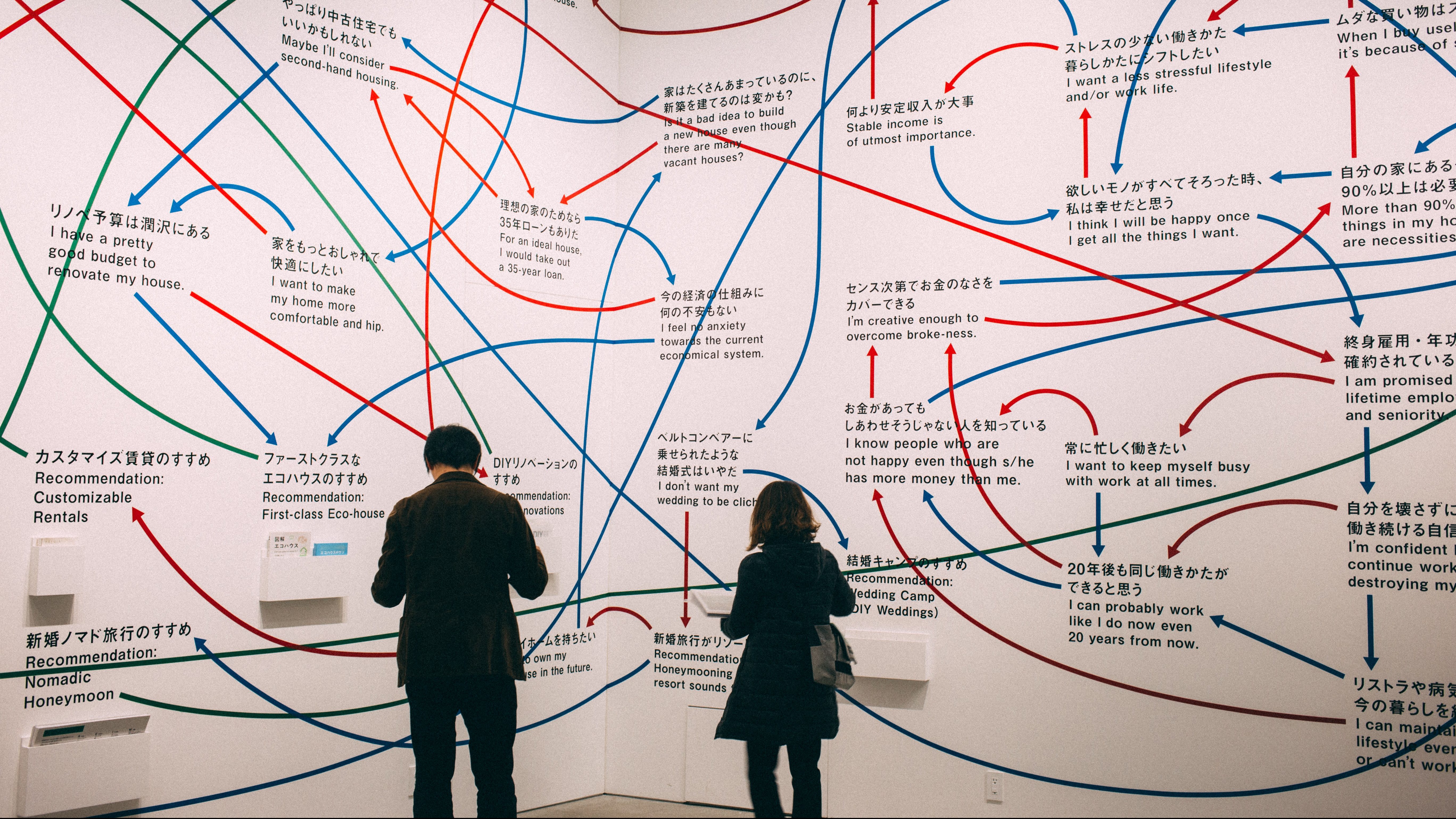SIMON SINEK: There's a statistic that over 90 percent of people go home at the end of the day feeling unfulfilled by their work. This is the difference between liking your job and loving your job. You can like your job, but do you love your job? And over 90 percent of the people who work these days don't, and I imagine a world in which that statistic is completely reversed.
DAN CABLE: The evidence is that about 70 percent of people are not engaged in what they do all day long, and about 18 percent of people are repulsed. They're actively disengaged from what they do. And I think that the reason why I say this is a problem, and it could even be called an epidemic, is because work is mostly what we do. We spend so much more time at work than with our families or those things called hobbies, and so I think that the pervasiveness of people feeling like work is a thing that we have to shut off from, a think that we can't be our best selves, a thing that we have to get through on the way to the weekend. I think that that is a sort of humanistic sickness. And while it is bad for people, that's the humanistic bit, it also is really bad for organizations who get lackluster performance.
JOHANN HARI: I notice that lots of the people that I know who are depressed and anxious their depression and anxiety focus around their work. So, I started looking at well how do people feel about their work? What's going on here? Gallup did the most detailed study that's ever been done on this. What they found is 13 percent of us like our work most of the time. Sixty-three percent of us are what they called sleepwalking through our work—we don't like it, we don't hate it, we tolerate it. Twenty four percent of us hate our jobs. So you think about that, 87 percent of people in our culture don't like the thing they're doing most of the time. They send their first work email at 7:48 a.m. and clock off at 7:15 p.m. on average. Most of us don't want to be doing it. Could this have a relationship to our mental health?
CABLE: I didn't live back in the 1850s, but all the records suggest that you could buy shoes and those shoes would be sold by some store, some cobbler and maybe there would be three people that worked there. Rarely would there be five people that worked there. While that probably wasn't the best work in the world, each of the people in the store would watch the customer walk in and then they would make a shoe for that customer and then they would take leather and they would sew it and then they would give it. And around 1890 we got this different idea as a species where we should not sell two pairs of shoes each day but two million. And this ideal of scaling up had certain implications for how work felt and part of that was because it was decided that the way to do this would have extreme efficiency by breaking the work into really small tasks where most of the people don't meet the customer. And this idea of removing the meaning from the work was intentional. And the idea of removing the curiosity from the job was intentional. For Henry Ford curiosity was a bug, it was a problem and he needed to stamp it out in the name of reliability and quality. Now, I'm not saying we're still acting just like the 1900s, but I am saying that that's when we cut our teeth on management practices. So, I think it's, in my own opinion, a lot less about which industry and a lot more about the culture and the expectations for what different employees can bring to the party.
SINEK: When we feel safe in our own environment, when we feel that our leaders care about us as human beings and want to see us grow and build our confidence and our skills, when we feel safe in our own companies trust emerges, it's what happens.
CABLE: There appears to be a part of our brain called the ventral stratum, that's the technical term, or you also could call it the seeking system, and this system is urging us to explore the boundaries of what we know. It's urging us to be curious, and by the way I mean innately. And evolutionarily this system was developed to help us, to keep us learning. And so, when I learned about this seeking system it really turned me on, because it started to give me an insight into why disengagement from boring work that may not be a bug that might be a feature. We know that the concept of looking for the outcome or the effect of our behavior is something that our seeking system is urging us to do, but it's also interesting to take a step back from that and just think about how all of us have stories running around in our brains about why we do what we do.
JORDAN PETERSON: A lot of the meaning that people find in their life is purpose driven. And in order to put effort into something, to work towards something, you have to assume axiomatically that what you're working towards is better than what you have because why else would you do it? And there's a relationship like if it's way better than what you have it's obviously proportionally difficult so you try to balance difficulty with positivity let's say, something like that. But you're always aiming up if you're aiming. And if you're not aiming then you don't really have any purpose and that deprives your life of meaning and that's not a good. Because if your life is deprived of meaning then what you're left with is the suffering. That's not neutral, it's negative.
JAMES CITRIN: There our three forces that are at fundamental war with one another all the time: There's the job quality, the job satisfaction, the inherent attributes of the job. And that is are you working on something fundamentally important and meaningful? Are you learning? Are you growing? Are you working with people who you can really like and respect? Is the culture something you're very comfortable with? Then there's money, of course. Compensation sometimes is at very much odds with something that is generally meaningful or creative or fundamentally interesting and how do you weigh the differences between looking to make the kind of money that will help you pay back student loans, much less live the lifestyle you want to live. And actually, speaking of lifestyle, that's the third dimension, lifestyle. Lifestyle is where you want to live and where you want to work. How much your work schedule is in your control, control of your work schedule. How much flexibility to take vacations? Do you have to commute? And how were your actual hours? So, if you think about those three points in what I call the career triangle, job satisfaction, money and lifestyle, it's relatively easy to maximize one point on the triangle and it's often okay to maximize the second, but usually the third point slips. You can have it all, those three dimensions, but not necessarily at the same time, and certainly not in your first job or two or three coming out of college. It's okay to be honest with yourself to say what are the most important things to me now. And by the way, over your life when you're in your 20s, when you're in your 30s, when you're raising a family, the weighting on those three points can and actually will shift and actually knowing that will help you make good career decisions over the course of your career.
PETERSON: It's helpful to have a goal, it's necessary to have a hierarchy. It's not particularly useful to compare yourself to other people, but it is useful to compare yourself to yourself. That's the right baseline, that takes everything else into account and it's really practically useful. And I've done this in my clinical practice very frequently it's like okay let's take stock of where you are and then let's hypothesize about where you would like to be. It's a complex conversation because we want to figure out what's not so good about your present situation exactly, precisely, and then come up with a hypothesis about what your life would look like if it was better and then we can work on incremental improvement. There's some steps you can take that you would take that would make today or tomorrow fractionally better than yesterday. And then you can iterate that and that's actually unbelievably powerful. You hit the effect of compounding interest let's say very, very rapidly if you do that. So, there's real utility in incremental progress and you don't have to improve your life much in increments to start hitting the effect of compounding interest. You make one thing slightly better and that increases the probability that you'll make the next thing slightly better as well as having its positive side effects. And so, even if you make small steps forward and you do that regularly that can turn your life around very rapidly over like a one to two year period. I mean that's a long time one to two years, but it's not a lifetime, and it certainly beats the hell out of going downhill precipitously, which tends to be the alternative.
AARON HURST: What we've seen in our research is that we're wired to find meaning in different ways at work. We don't all get a sense of purpose from the same things. And that doesn't mean different causes, it actually has to do with the elevation of meaning in your work. For about a third of the population, they get the most meaning at work when they can directly see their work impacting other people. They need to have that visceral sense that their work actually made an impact in someone's life. No matter what the impact is if they don't see that visceral connection, they don't feel a sense of purpose. We then have about a third of the workforce who gain much more meaning from working at an organizational level. They say it's great to help people but all ultimately I want to build a more sustainable impact by helping build teams, to build organizations, to build institutions that can make a longer sustained impact on the world. And when I see helping a given patient that's meaningful, but I would rather help a thousand doctors serve a million patients and be part of that equation and that's what's really going to get me fired up. For people who really get a lot of meaning from that organizational team level there's so many ways to do that, but at the core it's about building teams, building organizations and you can do that in any industry. The final elevation when it comes to purpose is what we call at a societal level. Some people say it's great to help a patient, they definitely need it, it's great to build hospitals and we definitely need hospitals, but at the end of the day if we can't reduce the cost of healthcare, if we can't address cancer, if we can't address some of these systemic issues are we really moving the needle? I need to see, even if it's in a very small way I need to see that my work rolls up to something bigger than any one person or organization. And this doesn't have to be about solving climate change or addressing world hunger, it could just be about bring the latest trends in your industry into your organization or helping to advance trends in your industry. It can be about things that are simply connecting what you're doing to something bigger than any one person or organization. And for this person, which is again about a third of the workforce, they need to see their work that way. What's interesting about these three elevations of impact is they enable us to find meaning in any job if we approach it the right way and it shows how accessible purpose can be when we take responsibility for it in our work and start to think about okay I'm an organization level person, I'm in this job, how do I optimize around that? And as I reflect on my work how do I look for examples of how I'm making that impact? Whereas the person who is individually driven might be doing the same job but looking for different signals and appreciating and having gratitude for different things. What we've found is that there are people who start their career at a societal individual organizational level and they generally stay in that level. It's not a question of going from individual to org to society, it's not a graduation process, it's actually how we're wired.
CABLE: I process this film and I clip this out and I upload it and those are the behaviors of the work. You also can think about the why of that work. What do I do? I delight customers by putting this film online that they can watch and enjoy. What do I do? I build an automobile, which is a piece of equipment that moves 80 to 100 miles an hour. Those can all be true stories but what we're finding is is a lot of time this sense of purpose, the higher order purpose is lost. And it's lost and it's nudged out by the lower level what do I do with my body all day long? The evidence and the research suggests that when we think about our work as a set of behaviors, scripted behaviors that we do in a repetitive way, we lose stamina, we lose resilience. When we think of it at a high level of construal, the why of the work meaning what is the impact, the final result of this on the world, it really makes our stamina higher, makes us much more resilient to difficulties in accomplishing that effect.
SINEK: This point in my life that I made this discovery this thing called the why and what I learned is that every single organization on the planet, even our own careers, function on three levels: what we do, how we do it and why we do it. These are the things that we think make us different or special compared to everyone else, but very few of us can clearly articulate why we do what we do. And I don't mean to earn a living or provide for your family, those are results, by why I mean what's your purpose? What's your cause? What's your belief? And after I learned my why I literally stopped telling people what I did and only started telling them what I believed. And not only was my passion restored but my career and my life changed dramatically and took on an entirely new path with vastly more meaning.
HURST: Where we find meaning actually ties back to the patterns that we see in the world, how our brain works, the level of intimacy and connection that we want with people based on our profile and a lot of other variables that actually are why we gain meaning from one thing where someone else doesn't. So, I encourage everyone to take a few minutes and really just reflect on what elevation do you find the most purpose at? I'm sure you find meaning at some level on all three levels, but where do you find the most meaning and redesign your identity and your job around that.






